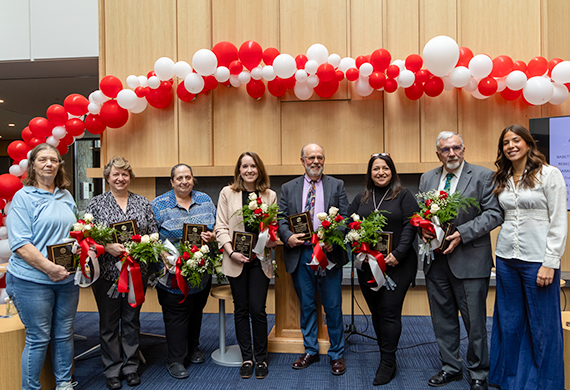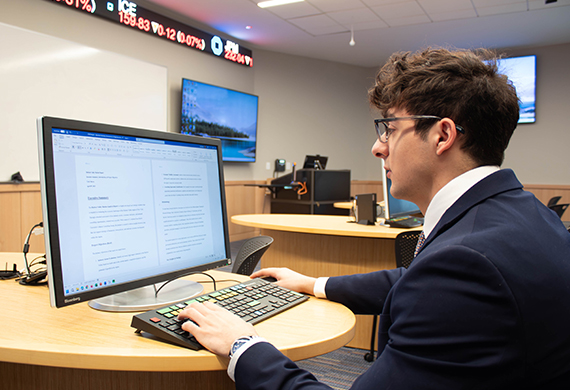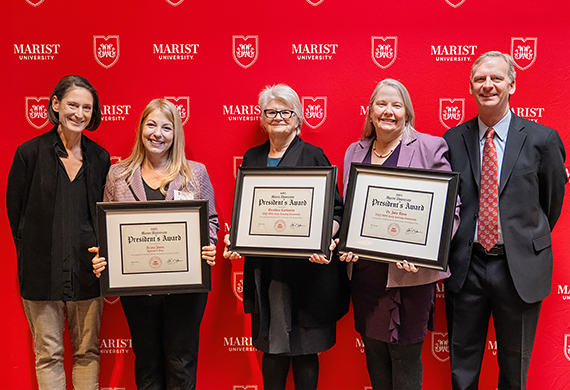#MeToo: “The Revelation That Needs to Become a Revolution”
May 23, 2018 — The emergence of the #MeToo movement has been one of the most significant developments in recent political history, forcing the problems of sexual harassment and assault out into the open and bringing to account a startling number of powerful men in the worlds of business, entertainment, politics, technology, and academia. So compelling is the subject that it inspired a recent conference at the Payne Mansion presented by Marist’s Raymond A. Rich Institute for Leadership Development. Coinciding with Women’s History Month, “After #MeToo: It’s OUR Turn to Lead” provided a venue to discuss the challenges women face in the workplace and the importance of having more women represented in positions of leadership across all areas of society. In light of the ongoing national conversation sparked by #MeToo, the topic is both timely and of broad societal importance: Where do we go from here? What have we learned? And how can we do better?
Addressing these questions and more were distinguished guest speakers Leslie Richards-Yellen, Director of Inclusion – Americas at Hogan Lovells; Kelsey Donohue ’13, communication advisor and former Assistant Press Secretary to First Lady Michelle Obama; and Helen Rothberg, Professor of Strategy at Marist and author ofThe Perfect Mix: Everything I Know About Leadership I Learned as a Bartender.The speakers also participated in an open panel discussion moderated by Director of the Marist Poll Barbara Carvalho ’79. The audience, which was made up of both community leaders and Marist faculty, staff, students, trustees, and alumni, had the opportunity to engage the panel in a question-and-answer session followed by a cocktail reception.
In his welcome, Marist President David Yellen set the stage. He noted that by hosting events with a leadership theme, the College aims to prepare and inspire students to become leaders in their fields after graduation. However, “as a society, we still have a long way to go for women’s equality and women being represented at the leadership level.” Yellen cited statistics showing that only about one in three college presidents is a woman, one in five members of Congress is female, and women represent only five percent of the CEOs of Fortune 500 companies. He continued, “For women of color, the numbers are even more troubling, and this lack of representation has real consequences for how organizations work.” As the #MeToo movement has revealed the age-old problem of sexual harassment and abuse, Yellen stressed the importance of looking beyond the actions of individual harassers in specific situations and taking a broader view of the leaders and institutions that have tolerated abusive behavior, silenced victims, and prevented real accountability.
Leslie Richards-Yellen, an attorney with a background in tax-exempt bond work, reflected on the experiences she had as a young female lawyer in the 1980s and 1990s. She gratefully acknowledged the efforts of a senior partner to protect her from the unwanted
In Richards-Yellen’s view, we are in a time of great turbulence but also great opportunity. “Years from now, when we look back at when women reached full equality, it will be when thousands of points of hope and action created an inflection point that, once it was reached, nothing was the same thereafter.” She added that the #MeToo movement is creating a sisterhood of support and breaking the centuries-old construct requiring women to be silent, but noted that it lacked cohesion, full-time professional leadership, a clear mission statement, and action steps that resonate widely. Richards-Yellen advised that it’s better to practice what she calls “wise passion” to usher in lasting social change, i.e., passion fused with patience, realism, pragmatism, hope, inclusivity, strategy, and alliances. She also repeated the words of the late U.S. Congresswoman Shirley Chisholm, one of her heroes, “If they don’t give you a seat at the table, get a folding chair.”
Kelsey Donohue, a Marist graduate from 2013, brought the perspective of a younger generation of women. Interested in politics from a young age, in fifth grade she dressed up as Geraldine Ferraro and gave a stump speech, noting that her father had searched the thrift stores all over Long Island to find a red pantsuit for her to wear. And her career started impressively. As a college student, one night Donohue tweeted to then-Secretary of Education Arne Duncan that she was passionate about education policy and looking for opportunities. It worked, and she landed an internship. Eventually, she ended up working with “the most incredible sisterhood imaginable under Michelle Obama.” She added, “There were men, too, but they were allies and would never interrupt us in meetings.”
As Donohue pursued a path from communications major at Marist to communications professional in Washington, DC, she shared that she often experienced “imposter syndrome,” the feeling many people have of not deserving to be in the room or not being smart
enough. And her early days in Washington had some challenging moments. As an idealistic young professional determined to make a difference, it was disconcerting for an older male colleague at the State Department to tell her, “Kelsey, it’s so great you have this job. It’s really preparing you to be a wife one day.” She started looking for another job the next day, but she admits, “These moments really cause you to doubt yourself, and your imposter syndrome really comes to the surface.” In addition, DC is a notoriously tough city, particularly for young women. The power dynamic in Washington is often such that an angry ex-boyfriend can credibly threaten to ruin your career, so getting the phone call that Michelle Obama wanted to offer her a job was a wonderful moment and a triumph over imposter syndrome.
The power of female role models is not lost on Donohue. She recalled being at an event with Michelle Obama and Hillary Clinton. “Just looking up at these incredibly strong women supporting one another made me think that I can do this work. I’m smart and determined. I have a strong path, and nobody can take that away from me.” Even still, Donohue recognizes that women sometimes “opt out of their own opportunities” because of fear or doubt. She recommends positive self-talk, a network of supportive friends, and always reaching back and help others climbing the career ladder behind you.
For Helen Rothberg, this historic moment and Marist’s women’s leadership conference are about “celebrating women–their fortitude, determination, resilience, honesty, and compassion.” In her view, the #MeToo movement has been “an opening of a gate of secrets, whispers, and the tolerance of things that were intolerable.” Rothberg speaks from the experience of a career in the male-dominated fields of business strategy and consulting. While in graduate school, she sought a job as a bartender, but the owner told her that they didn’t hire women bartenders. Undaunted, Rothberg didn’t accept no as an answer. “For me, ‘no’ means ‘not now,’ ‘not yet,’ or ‘not this way,’ so I offered to come back on their busiest night and work for free. I knew I’d get the job if I could just get in the game. I ended up working for him for six years.” Being the only woman in the board room or C-suite could be difficult. She remembers introducing herself (in her business suit and pumps) as Dr. Rothberg and being asked, “When will Dr. Rothberg be here?” Assuming she was the support person, they couldn’t imagine the Ph.D. was a woman.
For Rothberg, #MeToo “is the revelation that needs to become a revolution” of zero tolerance and equal pay for equal work, but women must do their part, and this means resisting imposter syndrome. “We have to get out of our own way and not be afraid to 
Women, Rothberg noted, have the opportunity to forge a new style of leadership. Gone are the days of big shoulder pads and the notion that leaders must be hierarchical, competitive, and transactional. The qualities that characterize many women–transformational, collaborative, empathetic, supportive, collegial–are also important qualities in a leader. Only by changing our definition of leadership, she continued, will we be able to change the way organizations work. Said Rothberg, “Women have to step into those roles with the best that women bring to the table,” and her advice for achieving this goal can be found in The Perfect Mix: action, determination, vision, integrity, communication, and empathy.
In leading the panel discussion, Marist Poll Director Barbara Carvalho noted that Marist’s women’s leadership conference was “part of a much larger national dialogue,” and she provided some key context and statistics to help frame the debate. According to a recent National Public Radio/Marist Poll, there are 75 million women in the U.S. workforce, but men are more likely to be employed. While 57 percent of full-time workers are male, 62 percent of part-time workers are female. This is part of the reason that men were more likely to have received a raise in 2017. In addition, for every woman billionaire, there are 8.5 male billionaires, controlling seven times the amount of money. There is, however, one statistic where women outpace men: another Marist Poll showed that 35 percent of women had been harassed in the workplace, compared with nine percent of men.
Each speaker agreed that we appear to be at a tipping point in terms of societal change, not least because of numbers. There are more women in the halls of power, they have more male allies, and women are much more likely than in the past to believe they have earned their positions. Noted Donohue, “The pipelines of young woman are becoming much stronger. Also working in women’s favor? Economics. Numerous studies have shown that companies with more women in positions of leadership have a stronger bottom line. Those same companies also tended to have fewer problems with bribery, corruption, and fraud. So greater gender equity, in addition to being a moral imperative, seems to make good business sense. Added Rothberg, “In today’s competitive global environment, what’s going to ultimately win out is not just simple ROI, but who’s doing better work in a better way. If a company’s most important consideration is performance, then there will no longer be room for staff turnover and harassment suits. Women bring a different approach to business and they’ve proven they can achieve great results.”

About the Raymond A. Rich Institute for Leadership Development
The Raymond A. Rich Leadership Institute sponsors and supports many leadership programs at Marist College in undergraduate, graduate, and corporate education. The foundation of the Rich Institute’s work is a unique leadership framework based on the following definition: leadership is the ability to set and accomplish the right goals, working effectively with and through others, within an acceptable ethical framework, while leaving the organization poised for future success. The Rich Institute was made possible through a generous bequest by Raymond A. Rich, one of the 20th century’s leading businessmen and industrialists.



